The Century
THE HUNDREDTH ANNIVERSARY OF THE “ANNEXATION CRISIS” WITH LONG-TERM CONSEQUENCES
Heralds of Storms and Freedom
A wave of fierce protests in Belgrade against the Austro-Hungarian annexation of Bosnia and Herzegovina in October 1908 was led by the poet Jovan Dučić and writer Branislav Nušić. People patiently waited in long lines to enlist as volunteers. “Brothers, Homeland is in danger! Let us gather together, join, embrace and die for the Homeland together!” spoke Nušić at the Theater Square, in front of the Monument of the Prince. “This is a critical moment!” cries Dučić from the front page of the special edition of “Politika”. “Our negligence in this moment would be cursed by our grandsons and great grandsons, and the curse of numerous generations would lie upon our graves!”
By: Jovan Pejčić
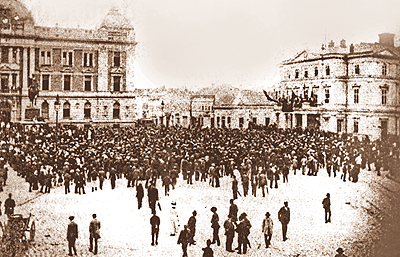 On October 5, 1908, neglecting severe warnings from Serbia and Montenegro, Austro-Hungary proclaimed the annexation of Bosnia and Herzegovina. On October 5, 1908, neglecting severe warnings from Serbia and Montenegro, Austro-Hungary proclaimed the annexation of Bosnia and Herzegovina.
The front page of the special edition of Politika, which came out at 4:30 p.m. on that almost merry autumn day, carried Dučić’s cry:
“People of Belgrade, Homeland is in danger!
This is a critical moment calling upon us today to say the word of decision. The Serbian tribe is experiencing one of the most critical moments; a rapacious sparrow hawk is hovering over the Serbian nation, aiming at it with its claws to make it bleed and tear out its guts.
Austria is threatening to predatorily seize Bosnia and Herzegovina from us…
People of Belgrade!
The freedom of the Serbian Peoples is at stake; the future of the whole Serbian tribe is at stake, the honor of a whole nation is at stake. The moment is critical, Homeland is in danger, our negligence in this moment would be cursed by our grandsons and great grandsons, and the curse of numerous generations would lie upon our graves…”
REPUGNANCE TOWARDS THE INTERNATIONAL PIRATE
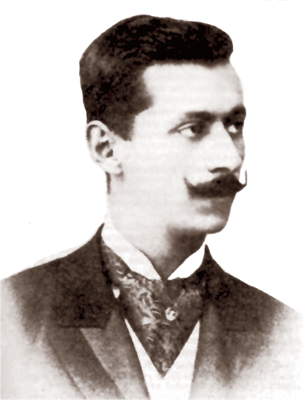 The whole Belgrade was up on its feet that Monday. The whole Belgrade was up on its feet that Monday.
This is how Radivoje Bojić, younger brother of the poet Milutin Bojić, author of The Blue Tomb (Plava grobnica) remembered that day:
“The teacher explained us, children in elementary school, the meaning of the word annexation and sent us home. When we ran out into the streets, we heard bellicose cries and threats to Austria. As if the whole Belgrade came to the rally.”
The Royal Government began an endless session.
At six in the afternoon that day, Branislav Nušić started from the Politika offices to the Prince’s Monument with a flag-bearer and drummer. Hundreds of citizens joined them on their way. When they reached the Monument, the Theater Square was already boiling from cries against the Dual Monarchy.
The gathering could not remain silent. This was clear to Nušić, so he climbed up to the pedestal of the Monument to Prince Mihailo. A flag-bearer carrying a Serbian flag joined him.
The war drum thundered, then became silent. The gathered people also became silent, expecting words.
Then Nušić addressed the people:
“Brothers,
The enemy is at the door! The sword of a plunderer is hanging over our heads! Austria is preparing to seize Bosnia and Herzegovina, and we, the Serbs, will not, cannot allow it!”
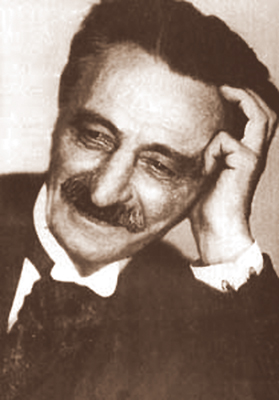 Nušić later recalled that the speech was “long and incitive, accompanied with cries of the people, approvals, and expressions of repugnance towards Austria, the international pirate”. Nušić later recalled that the speech was “long and incitive, accompanied with cries of the people, approvals, and expressions of repugnance towards Austria, the international pirate”.
Finishing his speech, Nušić scheduled another gathering for the following day. He invited the present people to bring their friends and acquaintances to the new gathering: so that the large number of them would show that they represent the opinion of the whole Serbian nation, the whole Serbiandom.
The rally on October 6 surpassed all expectations. The upset people not only filled the Theater Square, but also expanded all the way to “Ruski car” and “Kolarac”.
Now Nušić was not the only speaker. Members of the parliament, professors and students also joined him: Ljubomir Jovanović, Mihajlo Djordjević, Vojislav Marinković, Ljuba Davidović…
The bitterness of the people reached its culmination. Nušić takes the just made resolution, lifts its up and, with a thundering voice, submits it to general adoption.
The proclamation calls upon the centuries long Lazar’s wound:
“Ever since Kosovo, there has not been a greater danger awaiting the whole Serbian nation, and indirectly our dear Homeland, like this one today! [...]
In behalf of the whole Serbian nation, people of Belgrade place their lives and their property at disposal…”
The acclamation is unanimous. Enthusiastically, the people cry: “To the battle! To the Drina! War to Austria! Death to plunderers!”
THE WORD GIVEN AT THE THEATER SQUARE
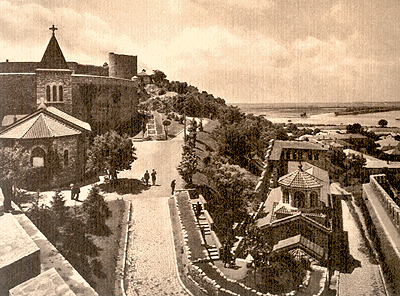 Nušić continues: Nušić continues:
“Brothers,
Homeland is in danger! Let us gather together, join, embrace and die for the Homeland together!”
Then he invited the gathered people to sign up as volunteers.
As if that was the moment they were waiting for, people began making rows. A tent was immediately raised by the Monument to Prince Mihailo, a table was set, paper brought.
Dučić, Vladislav Ribnikar and Nušić were the first to sign up.
More than two thousand volunteers applied until sunset.
That same evening, the municipality president Velizar Vulović organized an urgent meeting with the most respectable people of Belgrade. Nušić was one of them.
Seeing how massive the movement for signing up volunteers is, they all immediately agreed that it is necessary to create a “country-wide organization” which will manage not only the gathering and preparation of volunteers, but also other actions related to the annexation and resolving all other issues which attack and hurt Serbiandom as a whole. They also had in mind the still not liberated Old Serbia, Kosovo and Metohija.
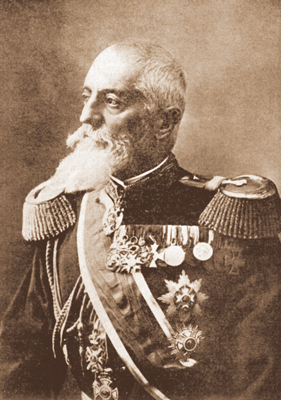 Another decision was made: to schedule an even larger rally for October 7. They determined the speakers at the rally. Another decision was made: to schedule an even larger rally for October 7. They determined the speakers at the rally.
Posters were printed during the night, as well as a proclamation to the people of Belgrade, which all newspapers printed on their front pages the following day.
The proclamation was written by Jovan Dučić:
“People of Belgrade!
Come today to the GREAT NATIONAL RALLY, all of you, big or small; come, fathers, come children; the sick ones, come out from your beds; mothers, bring your babies on your bosoms; all of you, come; the word of us all is asked for today, the word with which we will announce that we are ready to die, that we are ready to renounce ourselves, our lives and our property, our freedom and our state, rather than allow further subordination of our nation; rather than allow our neighboring bird of prey to further pull out part by part of meat from our bleeding body.
To the rally, people of Belgrade, in front of the Prince’s Monument, today at 3 p.m.!
To the rally!”
THE BIRTH OF NATIONAL DEFENSE
As Nušić recalled later, it was “the first monster-rally in Belgrade. Students left their schools, merchants closed their shops, and all of them gathered at the Square which proved to be narrow and uncomfortable for such manifestations…”
Two days later, on October 9, the National Defense was created. Branislav Nušić entered its headquarters.
Voja Marinković, one of its founders, later wrote:
“The creation of the National Defense was not a result of some plan, but one of those gestures one unconsciously makes when suddenly attacked.”
.jpg) Having in mind the popularity of the national movement originating from Belgrade – which spread throughout Serbia on the day of the annexation of Bosnia and Herzegovina – the headquarters immediately elected the president and the Central Board. Having in mind the popularity of the national movement originating from Belgrade – which spread throughout Serbia on the day of the annexation of Bosnia and Herzegovina – the headquarters immediately elected the president and the Central Board.
General Boža Janković was appointed president of the National Defense.
Branislav Nušić was unanimously elected as member of the Central Board. Besides other respected people, with him were also Ljuba Jovanović, Ljuba Davidović, Žika Rafajlović, Voja Marinković, Živojin Dačić…
The program of the National Defense was brought at the first meeting of the Central Board, held the following day. The most important assignments of the organization were:
“First: to encourage, support and strengthen the national consciousness; 2) to enlist and gather volunteers; 3) to form voluntary units and prepare them for armed actions; 4) to collect contributions, financial and other necessities for realizing its assignment; 5) to organize, equip and train special (komits) units, intended for special and independent warfare; 6) to develop actions in all other directions for defending the Serbian nation…”
For six months, the crisis initiated by the annexation of Bosnia and Herzegovina by Austro-Hungary didn’t calm down in Serbia and its capital. It was formally ended after the announcement of the Serbian government on March 31, 1909. Only then the voluntary units were released.
However, the National Defense remained. New circumstances didn’t change anything in its work. It only directed its actions towards another important issue, towards Old Serbia, and intensified them.
Branislav Nušić remained faithful to the ideals of the National Defense until the end of his life.
***
Volunteers
Already that day, until sunset, over two thousand volunteers signed up. Over four hundred university students, the same number of students of the trade academy, seminary, Belgrade gymnasiums.
The legion of death was enthusiastically formed, the legion of thousand which will, when the war begins, be the first to enter the battle, resolved to fight until the last one dies.
Nušić was signing up volunteers for the legion of death. The volunteers elected him as their commander the first day of enlisting.
People signed up in other legions too. They had their special names: “Obilić”, “Dušan the Mighty”, “Prince Mihailo”.
***
Viennese Calculations
The Dual Monarchy wasn’t calm either. The Austrian aspirations towards expansion only seemingly stopped at the Drina. A detailed official memoir of the Viennese government included the idea of further expansion of Austro-Hungary towards the east and the south. It was written by the Minister of foreign affairs, Aloise Erhenthal.
Vladimir Ćorović was especially engaged with this memoir, and comments the Viennese plan in his book Relations between Serbia and Austro-Hungary in the XX century. We shall follow his thoughts.
Erhenthal’s plan was the following: “If we would occupy Sandžak, the idea of uniting in Montenegro and Serbia would turn against us, and Sanždak would become a source of constant turmoils for us.”
On the other hand, if Austro-Hungary would move further to the south, it would – according to Ehrenthal – come into a conflict with the Albanians and lose all its influence on them: “Strong Albanian settlements in Sandžak and their fellow countrymen will bitterly confront any foreign occupation; it can only be in our best interest to turn that resistance against the Serbs and the Montenegrins and thereby maintain the traditional hostility between the Albanians and the Slavs.”
In case, says Ćorović, “rotten Turkey collapses one day”, Erhenthal’s plan intended to provide Austro-Hungary safe borders towards the south in advance. “Those safe borders”, warned the plan, “we will not acquire if we don’t decide to grab the evil at its root and if we don’t put an end to the Serbian dreams of future expansion.”
In this part, Baron Erhenthal transferred the Viennese calculation on to the Bulgarians:
“The antagonism between the Serbs and the Bulgarians is a factor we should count on even today; there is a common conviction in Bulgaria that the road to Macedonia must go through the body of the Serbian state, and it is certain that the most terrible battle will break out between Serbia and Bulgaria over Skopje. If we help the Bulgarian cause in that battle, and support the creation of Great Bulgaria to the disadvantage of Serbia, we will make the necessary preparations to place our hand on the remains of Serbia in the moment of a favorable European constellation. Then we would have safe borders I have spoken of: Albania, which would become independent under our aegis; Montenegro, with which we maintain friendly relations, and Great Bulgaria, which would owe us gratitude.”
|
